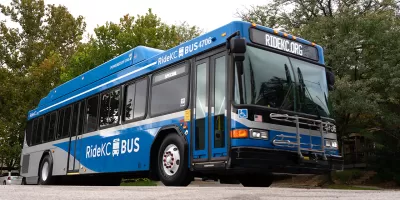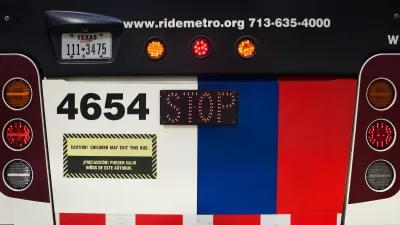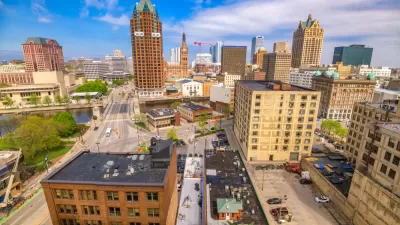A new on-demand transit service is meant to fill gaps in Kansas City regional bus service, but some transit supporters worry the service is drawing funding away from fixed-route buses.

A push to promote an on-demand transit service in Kansas City is drawing concern from transit advocates who worry that an overreliance on on-demand services will lead to a loss of reliable, fixed-route bus service, reports Noah Zahn for KCUR.
Known as IRIS, the new Kansas City service is meant to fill gaps in existing bus routes. It is the first program of its kind to cover an entire city of this size in the United States, according to Tyler Means, chief mobility officer for the Kansas City Area Transportation Authority (KCATA).
“However, there are some concerns that IRIS could result in less access to public transportation, not more. KCATA announced recently that it’s ending the Gladstone-Antioch Flex route, and all other bus stops in Gladstone will be discontinued beginning September 1.” The city of Gladstone says KCATA almost quadrupled the price of its contract, forcing it to end transit services. “Instead, Gladstone opted for a three-month trial of IRIS at $7,000 per month.”
IRIS only runs from 6am to 6pm, a dramatically shorter schedule than RideKC buses. On the other hand, “Means says the average wait time for an IRIS ride was under six minutes, while current bus lines only make stops in Gladstone every 30-60 minutes.”
FULL STORY: Kansas City sees IRIS as the 'future' of public transit. But is it coming at the expense of buses?

Study: Maui’s Plan to Convert Vacation Rentals to Long-Term Housing Could Cause Nearly $1 Billion Economic Loss
The plan would reduce visitor accommodation by 25,% resulting in 1,900 jobs lost.

North Texas Transit Leaders Tout Benefits of TOD for Growing Region
At a summit focused on transit-oriented development, policymakers discussed how North Texas’ expanded light rail system can serve as a tool for economic growth.

Using Old Oil and Gas Wells for Green Energy Storage
Penn State researchers have found that repurposing abandoned oil and gas wells for geothermal-assisted compressed-air energy storage can boost efficiency, reduce environmental risks, and support clean energy and job transitions.

Private Donations Propel Early Restoration of Palisades Playground
Los Angeles has secured over $1.3 million in private funding to restore the Pacific Palisades playground months ahead of schedule, creating a modern, accessible space that supports community healing after recent wildfires.

From Blight to Benefit: Early Results From California’s Equitable Cleanup Program
The Equitable Community Revitalization Grant (ECRG) program is reshaping brownfield redevelopment by prioritizing projects in low-income and environmental justice communities, emphasizing equity, transparency, and community benefits.

Planting Relief: Tackling Las Vegas Heat One Tree at a Time
Nevada Plants, a Las Vegas-based nonprofit, is combating the city’s extreme urban heat by giving away trees to residents in underserved neighborhoods, promoting shade, sustainability, and community health.
Urban Design for Planners 1: Software Tools
This six-course series explores essential urban design concepts using open source software and equips planners with the tools they need to participate fully in the urban design process.
Planning for Universal Design
Learn the tools for implementing Universal Design in planning regulations.
Ascent Environmental
Borough of Carlisle
Institute for Housing and Urban Development Studies (IHS)
City of Grandview
Harvard GSD Executive Education
Toledo-Lucas County Plan Commissions
Salt Lake City
NYU Wagner Graduate School of Public Service





























